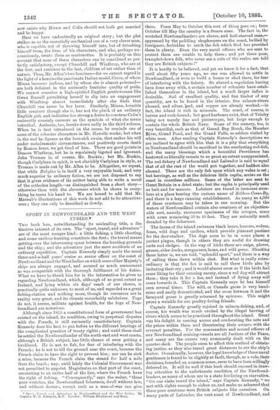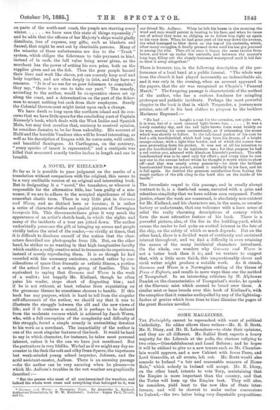SPORT IN NEWFOUNDLAND AND THE WEST INDIES.* Tins book has,
notwithstanding its misleading title, a dis- tinctive interest of its own. The "sport, travel, and adventure" are of the most meagre kind : a little fishing, a little shooting, and some cariboo-hunting constitute the first ; the travel means getting over the intervening space between the hunting-grounds and the ship ; and the adventure just the mere accidents of an ordinary expedition. Captain Kennedy simply made the usual three-and-a-half years' cruise as senior officer on the coast of Newfoundland and the West Indies on which some of her Majesty's ships are always engaged, and secured as much amusement as was compatible with the thorough fulfilment of his duties. What we have to thank him for is the information he gives us regarding Newfoundland, which, although of as great extent as Ireland, and lying within six days' reach of our shores, is practically quite unknown to most of us, and regarded as a great fishing-station and nothing more, though its resources are in reality very great, and its climate remarkably salubrious. Fogs do not, it seems, militate against health, for the fogs of New- foundland are notorious.
Although since 1855 a constitutional form of government has existed on the island, its condition, owing to perpetual disputes with the French, is still eminently unsatisfactory. Captain Kennedy does his best to put before us the different bearings of the complicated question of treaty rights ; and until these shall be settled the Newfoundlander of the north-east and west coasts, although a British subject, has little chance of even getting a livelihood. He is not to fish, for fear of interfering with the French ; he is not to till the ground near the coast, because the French claim to have the right to prevent him ; nor can he sink a mine, because the French claim the strand for half a mile from the beach ; nay, until lately the Colonial Government was not permitted to appoint Magistrates on that part of the coast, amounting to an entire half of the line, where the French have the right of fishing. " Consequently," says the writer, "these poor wretches, the Newfoundland fishermen, dwell without law, and without doctors, except such as a man-of-war can give
• Sport, Trarel, nod Adventure in Nevfoundiand and no West Indies. By Captain W. R. Kennedy, R.N. London : William Blackwood and Sons.
them. From May to October this sort of thing goes on ; from October till May the country is a frozen zone. The fact is, the wretched Newfoundlanders are slaves, and half-starved ones,— oppressed by the peddling shopkeepers on the coast, bullied by foreigners, forbidden to catch the fish which God has provided them in plenty. Even the very naval officers who are sent to protect them are unable to help them ; and yet these poor, trampled-down folk, who never see a coin of the realm, are told they are British subjects !"
It is hardly to be believed, and yet we know it for a fact, that until about fifty years ago, no one was allowed to settle in Newfoundland, or even to build a house or shed there, for fear of interfering with the fishery. So absurd a regulation having been done away with, a certain number of colonists have estab- lished themselves in the island, but a much larger influx is desirable. Soil of excellent quality, and fine timber of any quantity, are to be found in the interior, fine salmon-rivers abound, and silver, lead, and copper are already worked,—in fact, the island is rich in minerals. The coast, of course, is barren and rock-bound ; but good harbours exist, that of Trinity being not merely fine and picturesque, but large enough to contain the whole British Navy. Some of the scenery, too, is very beautiful, such as that of Grand Bay Brook, the Humber River, Grand Pond, and the Grand Falls, so seldom visited by white men. After reading Captain Kennedy's descriptions we are inclined to agree with him that it is a pity that everything in Newfoundland should be sacrificed to the everlasting cod-fish, and the many blessings which a bountiful Providence has bestowed so liberally remain to so great an extent unappreciated. The cod-fishery of Newfoundland and Labrador is said to equal that of all the rest of the world put together, and 'halibut also abound. These are the only fish upon which any value is set ; but herrings, as well as the delicious little caplin, arriveon the coast in countless millions. Some of the latter are sent to Great Britain in a dried state; but the caplin is principally used as bait and for manure. Lobsters are found in immense num- bers at a place bearing the curious name of Seldom-Come-By, and there is a large canning establishment. As many as 4,000 of these crustacea may be taken in one morning. But the waters of Newfoundland contain also creatures of an objection- able sort, namely, enormous specimens of the octopus, some with arms measuring 30 to 40 feet. They are naturally much dreaded by the fishermen.
The fauna of the island embraces black bears, beavers, wolves, foxes, wild dogs and cariboo, which provide pleasant pastime for the deer-stalker. The dogs seem to be in some places a perfect plague, though in others they are useful for drawing carts and sledges. In the way of birds there are snipe, plover, grouse, eider-ducks, mergansers, loons, and wild geese. Shooting these latter is, we are told, "splendid sport," and there is a way of calling them down within shot. But what is really extra- ordinary is that the fox is said to call these birds also by imitating their cry ; and it would almost seem as if the birds had some liking for their cunning enemy, since a red dog will attract them ; they take it for a fox, and instead of flying away will come towards it. This Captain Kennedy says he has himself seen several times. The wild, or Canada goose is very hand- some and easily domesticated, and the cross between it and the farmyard goose is greatly esteemed by epicures. This might prove a wrinkle for our poultry-loving friends.
Captain Kennedy greatly rejoiced in salmon-fishing, and, of course, his wrath was much excited by the illegal barring of rivers which seems to be practised throughout the island. Great was his delight in coming across and confiscating the nets and the prizes within them and threatening their owners with the severest penalties. For the commanders and second officers of our Newfoundland cruising-vessels are all Justices of the Peace, and many are the causes very summarily dealt with on the quarter-deck. The people seem to affect this method of obtain- ing justice, as they also travel great distances to see the ship's doctor. Occasionally, however, the legal knowledge of these naval gentlemen is found to be slightly at fault, though, as a rule, their decisions, founded on common-sense, seem to have beenwillinily deferred to. It will be well if this book should succeed in draw- ing attention to the unfortunate condition of the 'Newfound- landers, so many of whom are in a state bordering on starvation.
"On our visits round the island," says Captain Kennedy, "we met with sights enough to sicken us, and make us ashamed that these poor creatures were British subjects like ourselves. On many parts of Labrador, the west coast of Newfoundland, and on parts of the north-east coast, the people are starving every
winter we have seen this state of things repeatedly ;" and he adds that the officers of her Majesty's ships would gladly distribute, free of expense, any gifts, such as blankets and flannel, that might be sent out by charitable persons. Many of the miseries of these unfortunates are due to the "Truck" system, which obliges the fisherman to take payment in kind, instead of in cash, the full value being never given, as the merchant has the power of setting his own price, both on the supplies given and on the fish. Thus the poor people hazard their lives and work like slaves, yet can scarcely keep soul and body together, and are often deeply in debt, and they have no resource. "It is of no use for us poor fishermen to complain," they say, "there is no one to take our part." - The remedy, according to the author, would be co-operative stores set up along the coast, and a determination on the part of the fisher- men to accept nothing but cash from their employers. Surely the Colonial Government might insist upon such a change.
We have dwelt so long upon the northern island and its con- cerns that we have little space for the concluding part of Captain Kennedy's book, which deals with the West Indies and Spanish Main, but may first mention that, contrary to received opinion, he considers Jamaica to be far from unhealthy. His account of Haiti and the horrible Vondonx rites will be found interesting, as well as his description of Inagua with its cocoa-nuts, wild cattle, and beautiful flamingoes. At Carthagena, on the contrary, "every species of insect is represented," and a centipede was killed that measured exactly twelve inches in length and one in breadth.



































 Previous page
Previous page